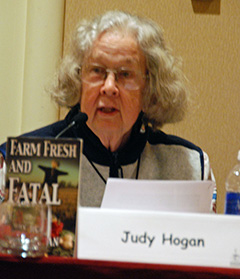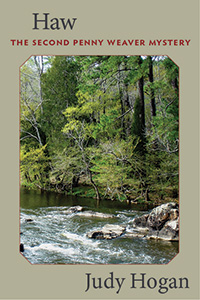Guest Blog: Judy Hogan on Trusting the Muse in Writing Mysteries
 Poet, novelist, memoirist, writing teacher, and activist, Judy Hogan draws on life experience for everything she writes. To see the range of her writing and sign up for a chance to enter a giveaway of her latest mystery, Haw: The Second Penny Weaver Mystery, visit her page on GoodReads.com. The giveaway ends April 26.
Poet, novelist, memoirist, writing teacher, and activist, Judy Hogan draws on life experience for everything she writes. To see the range of her writing and sign up for a chance to enter a giveaway of her latest mystery, Haw: The Second Penny Weaver Mystery, visit her page on GoodReads.com. The giveaway ends April 26.
My main guide to all my creative writing is from Virginia Woolf’s A Room of One’s Own:
“As long as you write what you wish to write, that is all that matters, and whether it matters for ages or only for hours, nobody can say. But to sacrifice a hair of the head of your vision, a shade of its color, in deference to some Headmaster with a silver pot in his hand or to some professor with a measuring-rod up his sleeve, is the most abject treachery, and the sacrifice of wealth and chastity which used to be said to be the greatest of human disasters, a mere flea bite in comparison.” (P. 110)
That advice has stood me in good stead since my twenties. I find it elsewhere, too. Elizabeth George, in her Write Away, says much the same thing. Louise Penny tried for five years to write a novel, and then decided to write the kind of book she loved, the traditional mystery. And she created a world she wanted to live in. She had trouble getting published until she was short-listed for the British Crime Writers best first mystery novel. She now hits The New York Times Best Seller lists.
I write what I wish to write, always have. I began reading mysteries in 1980, at age forty-three. Mysteries then seemed to be at the opposite pole from writing poetry. They do take different approaches, but in both cases I trust the Muse, or the Deep Unconscious, once I’ve worked out my characters and scenes, to give me first lines.
Quite a few well-known authors say they don’t plan, but I like George’s approach to fleshing out the characters first, learning their world, then drafting my way through all the scenes–in rough fashion, i.e., who’s in them, what the conflict is, what they are doing, sometimes a bit of dialogue. This is the hardest part, but I find, as I’m developing the characters and scenes that, if I ask myself questions, I get answers. That might come from years of writing poetry and diary, and going deep into my feelings. Then, as I write, I learn what I know about people that I didn’t know I knew.
All my life experiences go into my writing. In one way everything I write is autobiographical, though in fiction I take off from what I experienced into what I can imagine might have happened had the conflicts gotten even worse.
I also like taking up community issues which disturb me and which I’ve worked on myself. When you’ve sold at a farmer’s market, you learn about the behind-the-scenes conflicts, or in local politics, how the good guys can get power-hungry, and also how reluctant people are to change their views, especially about politics and religion.
I like to see stereotypes drop to the ground. Mine have over the years as I’ve come to know how much variety there is in people, and I try to get that into my characters. I like to read authors who explore people’s attitudes and behavior, and give us real people. What does motivate people who abuse power and try to control others? What causes some to find courage or persist when their cause seems hopeless?
I have had a few students in my novel classes writing mysteries, and I tell them they have to share on their page their characters’ inner feelings, the knowledge of which comes from knowing their own. The more you have access to and acceptance of your own feelings, the more you can create characters people care about. Then your readers keep reading, because you’ve generated suspense, i.e., they have to know what is going to happen.
I find you need to have interruptions every so often, to keep the pace going. To me, as a reader, good pacing doesn’t mean rushing and interrupting the flow with new events all the time, but it does mean that things happen to cause the plot to move in a new way before the reader gets bored. It should feel seamless, though a surprise, and still, not entirely unexpected. Some new difficulty for the sleuth might in the end help the plot toward resolution.
Elizabeth George is so conscious of everything she does, but even she says, “Trust your body,” which for me is trusting the Muse, trusting those impulses that come out of the blue. Maybe sometimes you start to feel bored and ask yourself what interruption can I have now, to jog the plot along better, and you get an answer.
You can learn these things and so many others by reading gifted writers of the past and present. Sometimes you can’t begin to imagine where you learned what to do with the plot or the characters in conflict. Some comes from stored experience and some from wide reading of the best possible models. With mysteries, go back to the Golden Age, Josephine Tey, Dorothy Sayers, Agatha Christie, Michael Innes, Ngaio Marsh, But also read Trollope and Jane Austen, Henry Fielding and Lawrence Sterne. You’ll write better when you’ve read those classics. I’ve seen it happen, and it amuses me to learn that George reads a little Jane Austen or equivalent before she starts to write.
 Mainly, make yourself happy. Enjoy it. Persist, learn, read, and never give up.
Mainly, make yourself happy. Enjoy it. Persist, learn, read, and never give up.
Judy Hogan
Coming May 1, 2016: Haw: The Second Penny Weaver Mystery, Hoganvillaea Books, 190 pp. Paperback: $15.00, ISBN-13: 978-1518818141; e-book: $2.99.
Book description: Penny Weaver, living in a shared house to save money, finds her unsavory, sex-obsessed landlord dead the day after Christmas. An unusual snowstorm, a housemate undeterred by detective orders from moving his numerous possessions, and certified and uncertified maniac suspects (including the neighbors and both the landlord’s wives) make it difficult for Penny and her Welsh lover to find love-making time, much less solve the mystery. Despite the sheriff’s detectives keeping Penny in the dark and arresting two innocent people, she persists in collecting key information in order to stop the killer.
Judy Hogan brought Hyperion Poetry Journal (1970-81) to North Carolina in 1971, and in 1976 she founded Carolina Wren Press. She has been active in the Triangle area since the 1970s as a reviewer, publisher, teacher, and writing consultant. In 1984 she helped found the N.C. Writers’ Network and served as the president until 1987.
Her first published mystery novel, Killer Frost, came out from Mainly Murder Press in 2012, followed by Farm Fresh and Fatal in 2013. Under her own imprint Hoganvillaea Books, she published The Sands of Gower: The First Penny Weaver Mystery in December 2015, and she will bring out Haw: The Second Penny Weaver Mystery, May 1, 2016. She has published six volumes of poetry with small presses and two prose works. She taught Freshman English 2004-2007 at St. Augustine’s College in Raleigh. She does freelance editing for creative writers and offers workshops.
Judy lives and farms in Moncure, N.C., near Jordan Lake. Her blog, postmenopausalzest.blogspot.com, often has reviews and interviews featuring contemporary mystery writers. Her website is judyhogan.home.mindspring.com.

Thanks, Carolyn. It came out beautifully. I’m glad it will be on Goodreads, too. My own blogs are. Recently on a panel I said that I wrote what I wished to write, and another crime writer, who is published by the biggies looked at me as if I were crazy. She spends a lot of time making sure her publisher is happy! Judy Hogan
Judy, Thank you for your wise and inspiring words. I have read and reread Elizabeth George’s book Write Away and try to follow her advice on creating characters. Congratualtions on your latest book.
–Maya Corrigan
I enjoyed every word of this heartfelt post. I’m happy to say I just finished reading a mystery by Josephine Tey (Miss Pym Disposes). I savored it over several evenings and posted my thoughts on my blog. Ms. Tey had her own way of writing a mystery, and we’re so so much richer for it!
Thank you, Mary Ann and C.T. So glad you liked my thoughts on writing. I love Josephine Tey, too, and have reread all her mysteries. Sometimes I go back to my favorite Golden Age writers and read their whole opus, using interlibrary loan to get ones my Durham library doesn’t have. Our deeper mind–unconscious–can be used for so much! Judy Hogan